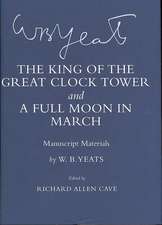The Abolition of Slavery and the Aftermath of Eman cipation in Brazil
Autor R Scotten Limba Engleză Paperback – 7 noi 1988
Preț: 227.73 lei
Nou
Puncte Express: 342
Preț estimativ în valută:
43.58€ • 47.48$ • 36.72£
43.58€ • 47.48$ • 36.72£
Carte tipărită la comandă
Livrare economică 23 aprilie-07 mai
Preluare comenzi: 021 569.72.76
Specificații
ISBN-13: 9780822308881
ISBN-10: 0822308886
Pagini: 182
Dimensiuni: 150 x 250 x 15 mm
Greutate: 0.25 kg
Editura: Wiley
ISBN-10: 0822308886
Pagini: 182
Dimensiuni: 150 x 250 x 15 mm
Greutate: 0.25 kg
Editura: Wiley
Cuprins
A Note of introduction / David Bushnell v
Exploring the Meaning of Freedom: Postemancipation Societies in Comparative Perspective / Rebecca J. Scott 1
Brazilian Abolition in Comparative Perspective / Seymour Drescher 23
Beyond Masters and Slaves: Subsistence Agriculture as Survival Strategy in Brazil during the Second Half of the Nineteenth Century / Hebe Maria Mattos de Castro 55
Black and White Workers: Sao Paulo, Brazil, 1888–1938 / George Reid Andrews 85
"Mud-Hut Jerusalem": Canudos Revisited / Robert M. Levine 119
Index 167
Notes on the Contributors 174
Exploring the Meaning of Freedom: Postemancipation Societies in Comparative Perspective / Rebecca J. Scott 1
Brazilian Abolition in Comparative Perspective / Seymour Drescher 23
Beyond Masters and Slaves: Subsistence Agriculture as Survival Strategy in Brazil during the Second Half of the Nineteenth Century / Hebe Maria Mattos de Castro 55
Black and White Workers: Sao Paulo, Brazil, 1888–1938 / George Reid Andrews 85
"Mud-Hut Jerusalem": Canudos Revisited / Robert M. Levine 119
Index 167
Notes on the Contributors 174
















